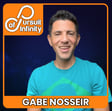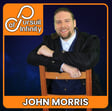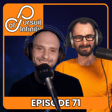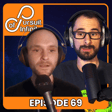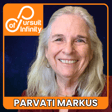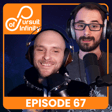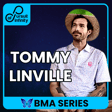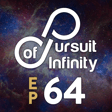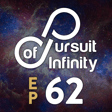Become a Creator today!Start creating today - Share your story with the world!
Start for free
00:00:00
00:00:01

60. Psychedelics, Healing, and Ancient Mysteries
In this week's episode we cover a wide range of topics surrounding psychedelics, the healing modalities that they support, as well as ancient mysteries and how all of these things tie into one another.
_________________
Music By Nathan Willis RIP
Follow Pursuit Of Infinity:
www.PursuitOfInfinity.com
Discord: https://discord.io/pursuitofinfinity
YouTube: https://www.youtube.com/channel/UCPpwtLPMH5bjBTPMHSlYnwQ
Spotify: https://open.spotify.com/show/58he621hhQ7RkajcmFNffb
Apple Podcasts: https://podcasts.apple.com/ca/podcast/pursuit-of-infinity/id1605998093
Instagram: https://www.instagram.com/pursuitofinfinitypod/
Patreon: Patreon.com/PursuitOfInfinity
Transcript
Introduction and Announcements
00:00:00
Speaker
Hello and welcome to Pursuit of Infinity, podcast where we explore the depths of human consciousness and delve into the fascinating world of psychedelics. It's been a little while since we posted an episode. Joe and I needed a bit of a break and we happened to get super sick at the same time as well. But we're back this week with one of my favorite conversations to date. We go all over the place in this one. And being that this is the first time that we got to sit down and record in so long, we get plenty to dig into.
00:00:28
Speaker
But before we get to it, a quick announcement. We have a special series of interviews dropping soon. As many of you may or may not know, I enrolled in the psychedelic sitter coach certification program through the Blue Morpho Academy. Blue Morpho is one of the highest quality ayahuasca retreats in the world.
00:00:47
Speaker
And the founder and master shaman Hamilton Souther created this program to train a new lineage of plant medicine facilitators in safety and best practices, as well as self exploration and communion with these fascinating substances. So I sat down with a number of the students for some amazing conversations. So keep a lookout for updates on that soon.
00:01:08
Speaker
As always, you can visit our website, PursuitOfInfinity.com, where you can not only listen to the pod through our integrated media player, but you can find all the places you can follow us as well. If you want to support the show, we really appreciate a follow, a sub, a five-star rating, and maybe even a review, as it helps to boost our standing in the algorithms, as well as the hearts and minds of our peers.
00:01:30
Speaker
If you're interested, we do have a Discord server. You can find an invite link in the description. There are general chat channels where anyone can join, so come on over and be a part of the discussion. But we also have some patron-only channels that are extra special, including channels dedicated to mushroom cultivation, giveaways, and livestreams.
00:01:50
Speaker
If you're an avid listener and you want to show us some extra support, you can become a patron at patreon.com slash pursuit of infinity, you know, get some great stuff in return. So head on over there for the details. And also before I forget, we have a YouTube channel at youtube.com slash at pursuit of infinity. All of our episodes are always posted there in video format as well as an array of shorts that we've been putting together on a regular basis.
00:02:16
Speaker
Now with all that out of the way, thank you so much for listening and I hope you enjoy this week's discussion.
Existential Crises and Psychedelics
00:02:36
Speaker
On your pursuit of truth, your spiritual path that you've been on, have you yet, which I imagine you have, but have you yet encountered like what they would call the dark night of the soul or like in learning a new truth about reality, some maybe panic or despair or
00:02:58
Speaker
Have you had any type of, I guess, existential crises over something that you've learned through psychedelics or whatever methods that you used?
00:03:11
Speaker
I would say early in my exploration of psilocybin, there were a lot of existential questions and things like that. Um, I've had some dark night of the soul experiences while on psilocybin, like going through the psychedelic experience and actually having that hero's journey trajectory.
00:03:34
Speaker
But surprisingly, I haven't really had any true dark night of the soul type journey situations where outside of the medicine I felt in some sort of existential despair. Generally what the experience of destroying my paradigms has done for me has been it's been positive for the most part, you know, it's it's been an ability to or an opportunity to put
00:04:04
Speaker
my psyche back together in a way that is
00:04:09
Speaker
we'll say more efficient, more informed than it was prior, and more comfortable within my own self. So I haven't had too many experiences of Dark Knight of the Soul outside of actually in the experience itself.
Solipsism and Consciousness
00:04:23
Speaker
How about you? I pretty much agree with your experience. That's kind of what I've had. More like earlier on in my path, I think I've had
00:04:36
Speaker
some moments like that, especially of course, I think most people will have that on a high dose of psychedelics, you'll go through some, you know, paradigm shattering experiences and learn things about yourself and reality. But what made me think of that is, in my study of like epistemology, and just my contemplation exercises, there was a time where I wouldn't say I was
00:05:05
Speaker
convinced of solipsism, but I was contemplating solipsism, just thinking about it. Solipsism being that the only thing that exists is my finite mind, that basically everyone else is an NPC in a sense. Because it's like with epistemology, I thought about basically
00:05:29
Speaker
I mean I kind of knew this already, but I really focused on the realization that there's no way I could ever know that anyone else was conscious in the sense of sentient. So when you contemplate that and think on it, it's like you can attach yourself. I can see how solipsism is like…
00:05:49
Speaker
I don't want to say an attractive idea, but an idea that people could latch onto because in a sense, it's hard to disprove. I think there are experiences you can have where you will discover that it's not the truth, but I think that's, from my experience, mainly only from some type of intense psychedelic experience. But I don't know, have you ever contemplated solipsism or what are your thoughts on solipsism?
00:06:19
Speaker
Yeah, I think solipsism is one of the early lessons that I sort of learned. And I think it's a valuable one as well, but it never brought me to a place of negativity. But what I see now is I was green. You know what I mean? I was less experienced and I was more easily commandeered
00:06:40
Speaker
by an idea than I am now, more attached to my ideas. So when I did have something come up, like a true solipsism, you know, type mindset, I got lost in it a little bit, but not lost in a bad way. Like it didn't make me feel bad or anything like that. It didn't, I didn't have trouble contemplating it or integrating it into my life at the time. But, you know, what I've been learning now is that
00:07:08
Speaker
Everything that we, every label, every philosophy, every way of contemplating the infinite or the great mystery is just a framework. And it's just a perspective from a mindset that maybe had an experience or had a few experiences that led you to think that way. But.
00:07:35
Speaker
None of these things are finite. None of these things are actual accurate ways of describing what the mystery is. And what I'm realizing now is that the more perspectives that you can come at something from, the more context you have to learn about it in a deep way. And I try not to marry myself to any of my ideas because I know that they're just my ideas.
Psychedelics and Personal Journeys
00:07:56
Speaker
You know, they're just.
00:07:57
Speaker
They're my experience. And, uh, you know, I've been doing this blue morpho Academy, uh, course and, um, shouts out to the cohort and shouts out to Maestro Hamilton. Um, one of the things that he teaches is that when a lot of people talk about, say the psychedelic experience, when they talk about ayahuasca, when they talk about mushrooms, they'll say, you know, mushrooms is this, the spirit of the mushroom is that.
00:08:23
Speaker
You know, what you'll experience is this. And what he taught us to sort of frame things in is a perspective of in my experience, it's this.
00:08:35
Speaker
This one time I felt it, it was like this. It showed itself, it presented itself like this. Because especially in the psychedelic realm, things are going to always be changing, growing, evolving. And after 10, 20, 30, 40, 50 experiences, you're never going to have the same perspective as you did at 20 experiences or whatever.
00:08:57
Speaker
It's always gonna be changing, it's always gonna be evolving, and it's important to not put any sort of definitive statements on your philosophy or how you look at things, whether it be through a religious lens or through, you know, an epistemological lens.
00:09:14
Speaker
Yeah. And I noticed like, as far as putting a, uh, like a label, like psychedelics or this or that I've noticed in at least, you know, talking to people about their experience. Like I've talked to quite a few people about, you know, usually it's about mushrooms, more of the people I know more people that have done psilocybin. And it's really crazy because if I sit there and say, you know, uh, a mushroom experience is X.
00:09:41
Speaker
But they tell me theirs and it's totally different than the things I experience. And I think it's such a personal journey to go through. It's like it's impossible to tell someone what they're going to experience on mushrooms. Just I think the one thing you can say pretty definitively is that
Mental Health and Spirituality
00:09:59
Speaker
psilocybin is powerful and that's about it and you can't go in it much more detail because i've heard you know such varying experiences and even like continuing varied experiences like one person i'll talk to a single person who each time experiences psilocybin differently than i do so it's like it
00:10:21
Speaker
I think it's, you know, totally dependent on the individual to see for themselves. Like I imagine, you know, you know, before you ever did mushrooms, you did a lot of research and looked into it and prepared yourself, but nothing can truly prepare you for the experience and no other person can tell you what it is.
00:10:42
Speaker
Yeah. And that's why when somebody asks me what it feels like or what the experience is like, it's really hard to describe it to them. I try to use words that, uh, I think they'll understand that can fit within their cultural context. And again, I always started by saying in my experience, this is how it felt or this is how it was, or at this particular trip, in this particular moment in my, um, spiritual path, this is what it was like. But what I like to say to people is like,
00:11:12
Speaker
I can't tell you what the experience is going to be like because it can have such a wide range of variety. But what I will say to you is that it has the potential to be one of the most powerful experiences of your life. And it's most likely going to be very powerful. What direction it goes in, that's up to you.
00:11:34
Speaker
Um, you know, if it's a situation where like I'm sitting for someone, then, you know, I can tell them, you know, I'm here for you. Uh, if anything does go wrong or if things, you know, whatever direction it goes in, it's going to be okay because I'm going to be here to help ground you in this and that. Uh, even when, if I'm taking the substance with the person, it's the same, you know, I'm going to be here for you here to ground you here to help you through it. Um, but yeah, I like to say it's just going to be powerful. I don't know in what direction it's going to go, but that's about it.
00:12:04
Speaker
It's something that like you don't really think about in your standard state of consciousness is basically how limited language is because it really works well for our standard survival needs and just you know our normal living and then it's like not till when you take psychedelics at least for me is like when I realized
00:12:26
Speaker
how limited language really is. It's like in a lot of my experiences it's like I can't talk because it's like you can't, the language is so limited that you can never convey what's happening. I mean it's just, it's something that you know in one of my experiences that I like just watched languages fall apart and turn into nothing and it's just
00:12:52
Speaker
It's so strange that you can have these experiences. Something as simple as that can really change things in your life or give you an insight that you couldn't have really truly gotten any other way. You could have maybe had the insight but not in a such an impactful and like true way.
00:13:10
Speaker
That's the interesting thing about psychedelics is that there are different ways to learn. You sit in front of a teacher and they tell you words and they give you a book to read or something. You take notes and you have this teaching. You've been taught something. You've been given knowledge by some sort of superior authority figure. But with psychedelics, they teach you through experience. It's a different kind of learning.
00:13:33
Speaker
Through the Blue Morpho Academy, we had a live Zoom ceremony where our master shaman instructor, Maestro Hamilton Souther, he was conducting an ayahuasca ceremony in Peru at the same time as he was conducting the ceremony for us. We shared through Zoom the experience of having an ayahuasca ceremony, and people took their own substances. I happened to take mushrooms.
00:14:03
Speaker
And it was a wonderful learning experience. And, you know, near the end of the peak, you know, that's the reason I bring it up is because I've, I really resonate with that, that teaching aspect of it through experience, because I just felt the mushroom teaching me things that weren't language based and that weren't earthly. They weren't something that I could put into words, but I just kept thinking to myself, God, these things are just the most amazing, magical, wonderful teachers.
00:14:31
Speaker
But if somebody would have asked me, what did you learn? I can't really say, you know, I can't tell you in a few sentences. It's an experiential type of learning. Yeah. It's like a rearranging of your DNA or something. It's there. The teaching is there and it has a true effect, but it's not something that you can convey or give anyone else. That's a thing like.
00:14:55
Speaker
You see this in regular life too. It's like when you tell someone something, you can't convince anyone of anything. That's how I'm convinced of that. If someone has an opposing view or doesn't quite want to know what you're saying or understand it, or they just are stuck to their belief, you can't teach anyone anything. But if they come to that same, like your conclusion,
00:15:19
Speaker
based on their own research or something you know if they come up with it on their own then they will adopt it and truly believe it and then they'll defend that one basically that belief but yeah it's like having uh experience is the is the best teacher for sure
00:15:35
Speaker
Yeah, man, you run into trouble when again, you marry yourself to your ideas. And we all do that to an extent. You know, if somebody walked into this room right now, and they told me that, you know, psilocybin mushrooms were actually cultivated on the earth by the devil. And, you know, they're here to sway you away from true spirituality, I would
00:15:54
Speaker
feel offended by that. And I would feel the need to defend my position. But again, that's, it's being married to a position. So even though it comes from a good place, and I believe it comes from a place of experience, and it comes from a place of love and knowledge.
00:16:10
Speaker
it's still an idea and I'm still married to it, which again is what I go back to. I like to say in my experience, this is how it felt. This is how it seemed. This is how it was. Not this is how it is.
Compassion and Oneness through Psychedelics
00:16:23
Speaker
This is what God is. This is what religion is. Even though if you press me enough, I do have opinions on those things. And I can like relate with that a lot because I
00:16:35
Speaker
I enjoy debating and going back and forth and figuring out whose idea can shine or when. I enjoy that. It's hard for me, and I've gotten better at this, but it's hard for me to not defend an opinion.
00:16:54
Speaker
And one of the things that I've done and like kind of a mode I try to put myself in is to like view perspectives as things to collect, not correct. So I'll try to just collect as many perspectives as I can while also sharing maybe my beliefs, but not in a way where I want to see whose is better or if I can prove to be right in some type of way. Just collect as many perspectives as possible because I've come
00:17:24
Speaker
It's hard to say this but I think it is inherently true that each perspective is very valuable no matter how wrong it may seem to you or if it's like the polar opposite
00:17:40
Speaker
It's still very valuable. And there are people that live that as true as you live yours. So it's like there's something valuable to me that I think of trying to, as I say, collect the experiences or the perspectives. Yeah. I mean, other perspectives just broaden the context in which you can understand your own. And it gives your perspective life. It actually contextualizes your experience to begin with.
00:18:08
Speaker
And, you know, with a lot of things that I personally find like very important, like a lot of the ideas we talk about on this podcast, I found that it is pretty difficult to convey them to someone who is on like a totally different wavelength, let alone convince them, not even convince them, just kind of have them
00:18:30
Speaker
understand it in a certain way. And I think, you know, there are some people who will, you know, you tell them about consciousness and the way reality is and the kind of speaking of idealism and, you know, spirituality. And if somebody isn't—some people are so, you know, against that way of thinking that that's where I think psychedelics are beautiful because I might not be able to convince you, but
00:18:53
Speaker
the experience of a psychedelic will teach you. At the very least, it's not going to give you answers if you're not looking, but it will show you that things are not as they appear to be. And it will often open you up to different ways of thinking.
00:19:08
Speaker
Yeah, it's funny you say that because last weekend, I think it was about last, no, weekend before last, I was up here actually. And I was talking to someone here and we were discussing a particular person that we know that was sort of going down like a path that we didn't necessarily think was best for them.
00:19:31
Speaker
I had voiced my concern for that person and for their feelings and what they've been through and sort of what brought them to the position to make the decisions that they're making and the person I was talking to said you're too soft.
00:19:46
Speaker
And I was like, no, it's not about being soft. It's about having compassion and cultivating compassion for yourself and everybody else in your life. And some people just can't hear that. They don't have that, that, that perspective. They haven't had the experience of maybe being broken down to, you know, to a point where you, you have to learn compassion or you can't make it through whatever's going, going on in your life.
00:20:09
Speaker
And that comes with the understanding of the oneness of reality. I mentioned in the early goings of the podcast, I don't want to say something that disturbed you or dark night of the soul, something that you had to contend with.
00:20:29
Speaker
is that when you have that realization and understanding of the oneness of that, what you are is me. You know, the whole thing that it's not like, oh no, you're just kind of like me. It's like, no, that is you. You're looking at yourself and, you know, your true self, not your ego self.
00:20:45
Speaker
It's like then you have to really deal with becoming more compassionate and empathetic like it just has to happen. It's like because you know you can feel and you know what they're going through is it's you going through it. So it allows you to become more empathetic with people.
00:21:04
Speaker
But it's also kind of hard because when you see horrible things happening around the world and it's not as easy to brush it off when you see people going through tough experiences, it's like you can often take on those feelings and that can be difficult sometimes. And I don't let that happen to me too much, but it will happen sometimes.
00:21:27
Speaker
Yeah, I think the benefit that I had was when I was a kid, when I was younger, I always inhabited this sort of mode of compassion. And it didn't fit into the schooling society that I was in. It didn't fit into the working society that I was in after I left school, every paradigm that I found myself in.
00:21:50
Speaker
felt I felt this unnatural form of contentment around me that just didn't work. And then when I took psychedelics, it expanded my ability to appreciate and understand compassion itself. And
00:22:10
Speaker
It felt like I was finally waking up into myself because I was able to just sort of disregard all of the negativity, all of the dark energies that were cultivating around me. And it felt natural. It felt like I was coming into my own and like I was coming home, like I could finally be okay within myself.
00:22:30
Speaker
standing in this position of compassion. So I think maybe I got lucky in that way to where I didn't have to contend with any sort of motive thought that I was stuck in that was opposite of compassion. That's why like I love Buddhism so much and I love Hinduism because there's a lot of sects of Hinduism like Bhakti where it's like all about love and compassion and the heart. And these are the things that resonate with me and you know psychedelics helped me to realize that
00:22:59
Speaker
There are versions of this. There are philosophies of this that are widespread that you can find, study, and learn from. As far as the empathy thing, I'll tell you the scale on which I'm talking about.
00:23:19
Speaker
I found myself feeling stupid at times, because even with somebody that you're having an argument with, it's hard to have an argument with them when you remind yourself of what's really happening. You're just yelling at a mirror. You're arguing with a mirror, basically, on many different levels. Because first off, what you're looking at is just your projection of the person. And then it turns out that projection of the person is a reflection of you, and that is you on many different levels.
00:23:48
Speaker
So like I find myself, I don't argue with people as much anymore because it's silly in a way. But then it goes from that to on a large scale of like understanding that like war that's happening. And it's like instead of I wouldn't say it's a negative thing. I'd say it's a positives thing instead of brushing it off and behind that has nothing to do with me.
00:24:09
Speaker
I have to actually recognize that it does affect me on my deeper self because it's me going through those things. Just because my perceptions aren't showing me that doesn't mean that it's not happening.
00:24:26
Speaker
And just I wanted to touch on how you just ended what you were saying there. It's like all that that you just described, it just shows why psychedelics are so important for mental health. It's like so many people have to. I know they do. They say we have a mental health crisis.
00:24:43
Speaker
feel like how you just described, like they just don't fit into this paradigm or the culture that we are indoctrinated into and told is truth. It's like so they're battling like for truth in their soul and it's like if a psychedelic can relieve that, I think that's something amazing that we have to, you know,
00:25:06
Speaker
really educate people about. And the thing is, it's like I think a big reason why people are feeling that way especially is there's no spirituality in our culture. There's no true connection to the divine. Like in a real way where you live your everyday life through the divine. You have a real connection with it and then you
00:25:32
Speaker
experience life as such. That just doesn't exist in Western culture. I'm sure there are groups of religious people, some that kind of feel that, but we're more secular than ever right now, and we have the meaning crisis. People don't have any purpose, and I think
00:25:55
Speaker
You know, delving into spirituality and really delving into it, not just saying I'm a spiritual person, but really giving it a try and then seeing where that takes you. And I think like you're a perfect example. And the same for me. I think it's changed my life in a way that I quite literally could have never imagined. I couldn't have imagined.
00:26:17
Speaker
the paradigm that I'm living in now, like the way that reality is to me is night and day compared to what it was. It's like a basically a death and a rebirth.
00:26:31
Speaker
It's magic. It is true. Your magic. There's no other word for it. I've never seen anything that is remotely close to having the power and the ability for change and healing as psychedelics. I mean, maybe I'm biased. Maybe I haven't tried enough things, but
Enlightenment and Awakening Paths
00:26:52
Speaker
Man, this seems like a streamlined route directly to the source of the healing energies of the universe that allow you to just heal. I mean, and it's not even like you have to go in there and re-experience your traumas or something. You're not going to a psychologist and talking about, you know, experiences in your past that destroyed you or something and that bring back those traumas.
00:27:19
Speaker
Like you're being healed of your traumas without re-experiencing them and that to me is such a gift. And it seems like with psychedelics that there is some like super intelligence to it where it's like it's orchestrated. A lot of times my trips feel like they are orchestrated like by God. That's the only way I could put it. It's like um it's just after it's done and I look back it's like it couldn't have been
00:27:48
Speaker
more perfect. It was absolute perfection, like the way you will be taken through possible trials and tribulations and shown something then brought somewhere and like, you know, you just go all these places and it all is straight perfection. And, you know, before I was, you know, practicing any of this and I was still atheist, I remember feeling like basically
00:28:16
Speaker
That there was no mystery, no magic that, you know, we, and it's even hard to say now because like, I thought that we had it all figured out, like that we've, you know, colored in all the spaces on the map. I thought that, you know, there was no mystery or no magic. And now it's like everything I look at.
00:28:38
Speaker
has is magical like it's like the reality itself life itself is pure fucking magic like there's nothing it it's indescribable i wish you know if i would have been this me talking to the old me they'd be i would be looking at myself like i were crazy i'd be like what happened to you you know because in that point of my life i was also so sure of all my perspectives and my ideas i was married to them like
00:29:06
Speaker
you know, my identity was my opinions, basically, you know, I was what I believed, you know, I just, you know, I could see how people, it's so easy for us to fall into like these identity politics, all this stuff, I think it's such an effective weapon to, you know, divide people because it's in our nature, if we have no divinity, and we're not chasing our
00:29:32
Speaker
working through some form of spirituality, we attach on to something else. I mean, it's in a human being's nature to worship. And if you don't worship the divine, you're going to worship the mundane. And that's not a good way to live. I mean, it's always going to come up short.
00:29:53
Speaker
Yeah, this is the idea that like, if you believe in, or if you live your life as if you believe in Christ, it's going to lead to a better outcome. You know, it's funny. These are all tools, religions, psychedelics, these things, they're all tools to live a better life.
00:30:11
Speaker
And instead of looking at these tools as descriptions of reality and descriptions of things that we can't even really understand and hold, I think it would be a great advantage to us if we looked at these things as what they were, as tools, as technology, as ways of navigating.
00:30:31
Speaker
Yeah, I like that. I think it's definitely a an interesting way to look at like psychedelics specifically as technology. I mean, it's it's so much more than that. But it's like, that is what it is in a sense. It's like spirit tech. You know, it's some type of otherworldly technology, and it can do things that are, you know, you know, it's before the experience, there's no way you could have possibly comprehended the reality of what you are capable of experiencing.
00:31:02
Speaker
And you just mentioned too, I just made me think of this, like, um, belief and, you know, if you believe in Christ, just, you know, act like Christ, you know, that type of thing between belief and action. And I often wonder sometimes like,
00:31:19
Speaker
If someone says that they believe in Christ and they know the teachings, but they don't act like Christ at all, sometimes I feel like that person might not really believe. I think it's easy to say you believe in things, but if you live your everyday life like they don't exist, I don't think you actually believe them.
00:31:44
Speaker
it's like that's the best example made me think of is like, even with like UFOs, aliens, like you ask a lot of people that think that maybe aliens or that aliens exist and it's like, yo, you really believe that? They're like, yeah, but they don't behave like they do because if they really knew it.
00:32:00
Speaker
there would be a massive change in behavior, I think. So it's interesting. It just made me think of that like the interaction between belief and action. I think the true way to see what someone believes is basically just how they act.
00:32:17
Speaker
and their practice. I just spoke to Lama Surya Das recently, and this is a guy who has practice. He has training from some of the greatest Lamas to ever live. The Dalai Lama himself calls him the American Lama. This dude really has a breadth of knowledge and experience, same with Ram Das. Anybody who has gone down the path
00:32:44
Speaker
and has taken it seriously and has done the practices, whether it be through psychedelics or spirituality, you can really tell in that person, you know, because there's like, there's a humility, there's a particular sense of humor that people have that have been to these places that is attractive. It's refreshing.
00:33:06
Speaker
Yeah, they exude peace. It's just like a very peaceful aura, just content, you know, void of lack. That's the thing we as human beings, we're always feeling that we are in lack, we lack something we have, we need something. But those people are the types that they realize the people that you just mentioned, they they're not in lack that they have
00:33:29
Speaker
everything they need. They understand that to like a very high level. And you know, you mentioned people like Ram Dass, all these like
00:33:37
Speaker
spiritual masters in a sense. It's like the very awesome thing about this practice that what we're talking about here is that that type of thing is available to everyone by your very nature. It is available to you. You have all the tools needed to become that type of person, get into that state of mind and understand things in a different way where you don't have to be feeling like you're in lack constantly and you don't have to be
00:34:06
Speaker
just always upset about something that's going to happen or upset about something that did happen. The accessibility is amazing. You don't have to have money. It's just there for everybody.
00:34:22
Speaker
Yeah. I mean, if I want to be a professional baseball player, I can't, I literally cannot do it. I don't have the gifts. I didn't have, you know, the training, all that stuff. But at any time in your life, at any time, any person can start this path.
00:34:38
Speaker
and can achieve a degree of what we call enlightenment. I don't like using that word, but I've, I've, I'm coming around to it a little more, you know, as I read certain texts and as I listen to certain people describe, um, you know, what it is or what it can be.
00:34:59
Speaker
I still don't believe that you can just like become enlightened and then you're like this spiritual fucking, you know, God that's floating on air all the time. You know what I mean? But there are I think degrees of awakening. Sure. That's what I would more prefer to call it instead of enlightenment because enlightenment sort of implies an end goal and there is no end to this. We're going to be doing this forever until the second I transition from this plane to the next. I want to be learning and I want to be evolving.
00:35:29
Speaker
see you bring up enlightenment and like I agree the word seems to have like so much baggage it's like people hear it and they they get all sorts of ideas in their head I mean it's really just a word first off so but I like Rupert Spira the he's like a non-dual teacher and I like the way he talks about enlightenment he just downplays it like crazy because in it he's kind of right
00:35:56
Speaker
I mean, he is right, but the way he puts it basically is like enlightenment. First off, he said what you said. I don't even like to use the word, which I understand. Like everybody expects that enlightenment is going to be this like massive experience with, you know, lights and colors. It's going to be just this crazy thing. And the way he puts it is like, no, enlightenment doesn't have to be that at all.
00:36:21
Speaker
He basically says it's just when you recognize what you are, like recognize what is actually going on, recognize your true nature. And it doesn't have to be deep in the DMT realm with the machine elves. You could just be sitting there. I mean Rupert Spyro is a perfect example of somebody who didn't use the psychedelic path. He used what he called the direct path. And he is one of the wisest people that I love to listen to and he's like, it's awesome to hear somebody like him say the things he says
00:36:50
Speaker
Knowing that he never touched the psychedelic which is like all these things that that he teaches are pretty much teachings of the psychedelic as well I mean and that's why I think there's so many methods to get there because no matter what truth remains truth
00:37:06
Speaker
Yeah, there are so many methods to get there. And there are so many different types of things that you can learn from psychedelics because there are so many different types of frequencies and energies that are in there. You know, there's the healing energies, there's, you know, the wisdom energies, the intelligence energies, the energies of the heart that can teach you. Yeah.
00:37:25
Speaker
I mean, there are so many things that they can teach you, but then there's also the tricksters. And there's, you know, the imposter energies, like there's so much wild shit in the psilocybin realm, especially. And man, there's just so many paths you can take to learn from it, which is why I just I adore it, man.
00:37:41
Speaker
Yeah. And that's why it's like impossible to tell someone what their experience will be like. Cause it varies so much. Like you said, all those different things all can happen. I mean, there's like, there's so many different avenues that it can go. And that's one of the reasons why it for me, it doesn't really get easier to do. It's like right before it. Cause there's still, you know, you've done this before, you know, it's powerful. You know that you've had amazing breakthrough experiences, but you know, you've also had hard experiences, challenging ones.
00:38:11
Speaker
So it's like even though you've taken it, you could go in many different avenues, different ways. You don't know what it'll be. So it's still, it's like every time you still have to pay the price. It's not like easy where it's just like, oh, I'm an expert now. Let me just do this. Because the moment you do that, you're going to get slapped down. The possibilities are endless.
00:38:31
Speaker
And your intention is so, so important. It changes everything. Like my intentions are slightly different than they used to be, you know, going through this Academy and everything, you know, my intentions had become to sort of communicate with the spirits of the mushrooms and.
00:38:49
Speaker
to basically like befriend them so that they're my allies so that I can learn how to transmute their energy and help other people during experiences. That's like the basis of sitting and facilitating for people is being able to.
Health, Gratitude, and Healing
00:39:05
Speaker
use and harness and guide the direction of the spirit of the molecule to heal people, essentially. That's why I said there's healing energies, there's intelligence energies, there's wisdom. And depending on where you want to go, what your intention is for the experience, you can have the intention to just
00:39:29
Speaker
open your heart and it'll help you to open your heart. But that might be a very different experience than if you go in with an intention to acquire wisdom or knowledge or help someone or heal someone or heal trauma. There are just so many different utilities that these substances provide, which is why they are the ultimate consciousness technology.
00:39:51
Speaker
And like all of those different experiences are going to be vastly different for each person too, which is also fascinating because what I've realized is like, I mean, it's pretty obvious, but it's the knowledge that you bring in to the experience and also your past experience that you bring into the experience just affects the experience completely.
00:40:17
Speaker
That's why the work that you do outside of the experience is important. You do the work outside the experience, then you come into the experience with more knowledge, more understanding, and you can be propelled even further rather than, you know, that's why there's such a vast difference between basically what we're talking about here and then
00:40:34
Speaker
I would say the vast majority of people who take psilocybin or LSD, whatever, you hear them like the concert goers, the ones that, you know, they take it and even like, you know, sometimes a decent dose, it's usually a lower dose than we're talking about when people do this, but they'll take a decent dose. And they're not in the position to get the type of experience we're talking about because it's not in, it's not on their radar. I found like for you, I could tell obviously it was and like for me,
00:41:03
Speaker
Because I have experience with both. The first time I did psychedelics, it was more in the kind of just see what happens, you know? It was still great and amazing, but the potentials of psychedelics weren't even on my radar yet. And my curiosity was it was it was there, but it wasn't as deep. It didn't have the depth that it had after, you know, doing more work and understanding more things about myself.
00:41:28
Speaker
And so after I see the vast difference between what a psychedelic experience can be on either end, and it's night and day. And also integration is very, very important. People that have big profound experiences and then don't properly integrate them into their life have a harder time sort of adjusting to the new framework that they've been given or given access to. And I find that
00:41:58
Speaker
For me, integration is based in how big a role is this new perspective going to have in your life? How large a part of your heart has been filled by this and how much are you going to dedicate yourself to walking this path? Like this podcast is integration. Look what we're doing here, dude. And sometimes like, yeah, like I, when you said the, um,
00:42:29
Speaker
where you know the Matrix thing and it's like, oh, like it could be scary. Because like to realize in a sense that you are all alone. In a sense, you are totally alone. And that can be scary for people. And I noticed this, I was thinking about it, and you look at the word alone, and it's all one. Like it's spelled all one. And that doesn't seem as scary that way. When you're alone, you are all one.
00:42:56
Speaker
And it's like a, that's like a beautiful thing. It's not a scary thing. And especially like, you know, it allows you to have deeper connections, I think too, like really appreciate people and appreciate the moment. Sometimes I find myself
00:43:14
Speaker
Now in like a very like just average situation and then I realize like this is the best moment ever like it's just there's it's perfect. It's perfect now the hard thing and this is where it like it. It really comes into play is like in moments of suffering can you do that.
00:43:35
Speaker
And it's not easy, it's a tall order. And I think people like, you know, Ram Dass, Rupert Spire, these people that you consider enlightened or ascended masters, like, they can do, they can hold that energy and that peace in deep suffering. And, you know, it's such a powerful thing. And it's, it's, it's powerful for everyone around them. They like just to witness that shows you that it's possible. And, you know, it's,
00:44:05
Speaker
Luckily, I haven't had anything of late be too major in suffering, but everybody suffers to varying degrees at different points in their experience. And I found that I can remind myself during suffering, like experience suffering, I can remind myself of what the truth is, what I am, and then it helps, but in certain circumstances, it is a tall order.
00:44:35
Speaker
Yeah, I've been lucky like you. Um, psychologically, I haven't really had, you know, too many traumatic suffering, uh, type experiences as of late, but. Unluckily I do have Crohn's disease. So in great moments of physical pain, I find myself trying to, to, to achieve this and trying to do this.
00:44:56
Speaker
I keep bringing up the blue morpho academy but it's a big part of my life right now and it's really teaching me so much. The basis of this is what our instructor calls sanctuary. You invoke sanctuary and there are three tenants. I won't get too far into it.
00:45:11
Speaker
But essentially, it's a code for your consciousness to ground yourself, heal, harmonize, reorient. And it's a really beautiful thing. It's a great technology. And, you know, part of the reason why we hadn't recorded in a while is because we were both super sick. And during my illness, I had just this insane headache that lasted like three days long, one of the worst migraines I've ever had.
00:45:39
Speaker
And during this migraine, you know, I'm trying to invoke sanctuary and I'm trying to ground myself and I'm trying to sort of, you know, work my way through it in just the way that you were describing. And it. It works, but it's not magic. It doesn't take away the pain. What it does is it creates a safe place to heal and reorient. And that, I think, is the most valuable part of it.
00:46:09
Speaker
It can make you at peace with not being at peace, you know, in a way.
00:46:20
Speaker
It's also like, it's just easier for me to appreciate the little things. It's like, cause yeah, we were both sick and you know, I felt horrible. And I thought of this quote, I don't know the exact quote, but you'll get the gist. And it's like, a healthy man wants a million things. He wants a million dollars. He wants, you know, everything. And a sick man just wants to be healthy.
00:46:42
Speaker
And it's like, you know, I'm sitting there sick and I'm like, all I want is to not be sick. So it's like, when I get better, remember that. You know, I have everything I need. I don't need to walk around living in lack and being like, I need more of this. I need more of that. No, remember how you felt when you were sick? You have everything you ever wanted from that moment to now. You just wanted to not be sick. You wanted health. That's it. And yeah, it just opens your eyes to things like that.
00:47:11
Speaker
Dude, I think about that every time I'm sick and I thought about that so much, this last past illness. And it's funny you bring it up.
Societal Deprogramming and True Knowledge
00:47:20
Speaker
When we were little kids, we were little. When our mom would ask us a question, she used to say to us, would you rather be sick and rich and everything in the world or poor and healthy? And as dumb kids, I don't know about you, but I always always say,
00:47:38
Speaker
You know what? If I'm sick, I can deal with the sickness and I'll just take the wealth. And she used to like gently show us and describe to us why we were wrong about that. And I totally get it now. I'm with her 100% there. I'd much rather be healthy and poor. Yeah, that's crazy thinking about that. Yeah, she used to do that all the time. It was like quite often. It was.
00:48:06
Speaker
I remember when you say it, I don't even have to think because it's conditioned. The way it felt is when a teacher calls in you in class, you got to give the answer. So I would give the right answer because I knew what the right answer was for her. But then you realize it's absolutely true. If you are sick, it's just
00:48:29
Speaker
Nothing else matters. I mean, and for me, I think that just says a lot about how we experience life all the time.
00:48:39
Speaker
We're just like totally deluded in so many ways, being like in the ego self. Like it's, it's really, sometimes it's difficult to, to live that way because I'm not perfect. I'm, I am totally still in my ego self a lot, but I know the truth and I try to practice through it. So it's like, uh, sometimes it's difficult, you know, because you, like you've catch yourself, which is a good thing because at least I catch myself.
00:49:06
Speaker
But, you know, it's like after living in this type of world and being conditioned the way we are, it's like it takes work to move through that. And that's why a lot of times I think and the way I started a big part of it, which I think is really important, I would advise people to do is like a long period of deprogramming. And that's why I talk about epistemology a lot. I think that helped me a lot too.
00:49:34
Speaker
kind of understand what I really knew and what I was just believing and holding on to and identifying with. So in a lot of with spirituality, it's not about like a lot of it isn't about gaining, it's about getting rid of. Like you don't need to get a bunch more information. I mean, there are aspects that you know, it's want to learn lessons and all that, but a lot of it is getting rid of what you held on to before and what you believed.
00:50:00
Speaker
Like the deprogramming aspect was, uh, it was really important for me. And going through it made me realize like all this shit I believe has no real basis in anything. It's just pure indoctrination. And because the other people around me have the same indoctrination, it seems to be true, but there's no basis in truth about like all this stuff. And you know, you start to get rid of it and then you have a blank slate to say, just take a breath and let's see what's true. You know?
00:50:28
Speaker
Yeah, and then you realize that the things that are most worthy of adding are relationships. Relationships to yourself, relationships to spirit, relationships to the energies of life, relationships to other people. Those are the things that are important to add and experiences, adding experiences. You know, I think it's one of the the lessons, the very first lessons I got from psilocybin was
00:50:58
Speaker
Travel. Get your ass out of this tiny little town you're in and go see some shit. Because there is just so much to experience around the world. I mean, I haven't, I haven't traveled even close to the amount that I want to, but there's so much to experience. And that's, I think, where a lot of the most important lessons come. I think it was Terrence McKenna who said, um,
00:51:26
Speaker
If you want to learn, sit in front of a mountain or a waterfall. You know, like stare at something like that. That'll teach you some shit. Sit in front of a tree. Sit under a tree. You know, meditate. The Buddha became enlightened under the Bodhi tree. Nature is a teacher. Experience is the real teacher.
00:51:46
Speaker
Yeah. Yeah, a tree is a good one, too. I think a tree is a good one. Um, we should go serpent mound. I'd love to. Yeah, I mean, it's close so we could try to do that. But yeah, there's no, that's what I was saying before. It's like experience is the only way to truly convince yourself of something. I mean, in a deep way where it really affects you because somebody can tell you something over and over again, and it just doesn't latch on.
00:52:11
Speaker
and you know that's with psychedelics it grips you up and it shows you it's so amazing i mean. Think about the the capability of your of our mind even the finite mind you know even it's a illusory but just what you can do with your mind is.
00:52:30
Speaker
It's like all this stuff that I never thought was possible. And even though, like, now, you know, we're, we're gaining an understanding of, like you said, with the psychedelics with healing, not just like trauma, but, you know, physically healing things.
Spiritual Journey from Nihilism
00:52:43
Speaker
that people can do with their minds. And it's something that we all know, but we don't apply or frame it in the proper way because we just call that the placebo effect. And it's weird because it's thought of and framed as like this weird thing that happens by accident or it's just like a way to test a pill. But when you think about it, it's like, that is pure magic. It's amazing that your mind
00:53:12
Speaker
can heal you and it makes sense because your mind is all there is, you know? There's no separate matter at all. So the mind is just, it's capable of so many interesting things that I never would have thought to be possible.
00:53:27
Speaker
It's just like now the possibilities are endless. Whereas before it was no mystery, no adventure, just nihilism, meaninglessness. Now you can see meaning in everything. Everything has inherent meaning. And it feels good to have left the place of nihilism. Because nihilism is destroying lives every moment of every day.
00:53:58
Speaker
a very prominent milestone on the path. When you start, at least in my, in my journey, when I started the journey of true, not trying to achieve true knowledge or just trying to find my way through, you know, in a, in a
00:54:18
Speaker
a genuine way. Nihilism was like the very first milestone. It was the very first signpost. And I really liked it. It felt really good to just hate on everything. It supported my atheism. I mean, and I was like, yeah, this is this is for me. I was so nihilistic. But
00:54:38
Speaker
I had to shed myself of that and some people aren't able to you know is is i was talking to somebody recently who really exemplifies what you were describing earlier and just sort of right now which is like he was telling me.
00:54:52
Speaker
He feels like there's nothing left to discover. There's no place for him to exude his curiosity. And he felt as if there was nothing left to figure out. And I was like, Oh man, you got to find a different technology, find a new tool and find a new way because, uh, that nihilistic part.
00:55:13
Speaker
often stems from the inability to find a new path of learning. Um, and that's exactly what happened to him is he was finding himself in a very nihilistic form and he's not happy about it. But at least there's that if you find that you're not really comfortable and you're not happy about your nihilism, it's a sign that you're ready to sort of move past it. You just got to find the right path.
00:55:39
Speaker
Yeah, that's like the the worst to be in that state. It's just it's it's dark. But it seems to me that like the way our society is right now, it seems like it's bread for nihilism.
00:55:51
Speaker
And even like in our pop culture, it kind of presents nihilism as cool. Like you're too cool for school almost. Like you don't care. You know, you're dark, you know, it's like kind of presented in a certain way where really it's just total shit and it's horrible for you. It's horrible for your health and mind. And like today, especially, it's like we have cell phones and it, and you know, when you're in the materialist state of mind and you're believing in just like,
00:56:19
Speaker
the way that you were taught the world is, and now you have a device in your hand that can answer, I mean, this is from the perspective of a materialist, I have this device in my hand that can answer every question. Everything is right here, I know it all. It's on the phone, that's what it says. Google says that, that's the truth. If you have any question, instead of investigating or pondering, it's like, no, this is the answer. Put the phone down, over. No need to think, no need to explore, nothing.
00:56:51
Speaker
It just feeds nihilism in a deep way. Not good. And you mentioned how just acknowledging your nihilism is like one of the first steps, I think, in going in the right direction. I think another step, which for a lot of people is small and maybe not even, you don't even think too much about it, is the step from atheist to agnostic.
00:57:10
Speaker
And I think that is like...
00:57:20
Speaker
And I think like, I don't want to speak for you, but I would imagine that now you, nevermind. I was going to say, you probably went atheist to agnostic right after your first mushroom trip.
00:57:31
Speaker
But you were probably already agnostic by that point, I would imagine. Just because you had the curiosity to even investigate. But yeah, like a lot of people, you know, when you're like deep in your nihilism, you are atheist. When you are deep in, you know, that type of mindset, you're like, there's definitely no God. I know it. If you believe in God, that's stupid. But then when you make at least one step where you're just like, it's one tiny step out of nihilism towards truth where you're like,
00:57:57
Speaker
I don't know. Maybe there's something. It's like the universe, you know? You create some type of physical representation for what you think God could possibly be.
Ancient Civilizations and Cosmology
00:58:08
Speaker
And then hopefully to later find out it was nothing like you thought it was and you could just never have imagined. But that step, I think, is an important one and one that I've recognized in myself. When I found myself becoming agnostic, I became less nihilistic. Like they coincided a bit.
00:58:27
Speaker
Yeah, for me, it was a book, I think, if I'm remembering correctly, what brought me out of my atheism and toward agnosticism was a book called Biocentrism by a guy named Dr. Robert Lanza, who I'd love to talk to. It's essentially a scientific paradigm that has consciousness as being fundamental. And when I read that book,
00:58:54
Speaker
It opened my mind to consciousness itself being that thing that stood in the place of God or the universe, whatever it was. I was like, Hmm, consciousness being a fundamental force of the universe and being sort of the projection at which everything is created. And it was a very interesting mind opening experience for me to read that book.
00:59:16
Speaker
And it really led me toward, you know, Alan Watts and Terrence McKenna and like all of these people who, you know, get you into psychedelics and spirituality. Of course, like the gatekeepers nowadays in our our society, everybody's listening to Alan Watts and Rob Dawson, Terrence McKenna. Those are the three amigos, I feel like.
00:59:36
Speaker
It's funny how like before even get like how naive and silly like my idea of what God was. It's like now I even give religious people like I actually love religion now and you know I give religious people more respect than I used to.
00:59:58
Speaker
But you know, the idea like when people think of God, they think that like, for some reason, religion has a monopoly on God. And what God is, is only the image of what a specific religion says. And that's not the case at all. I think each religion is just pointing to God, trying to point at the one same thing, the one consciousness. So it's like, but before you have that realization, it's like you think,
01:00:26
Speaker
that you can't believe in God because God is owned by religion and you're not religious. So I think it's false to kind of hold that belief, but I feel like that's a lot of atheists. At least me, that's the way I looked at it. It's like, if I'm not a Christian, then I don't believe in God. And if you're not a Christian, you don't believe in God or Muslim, whatever. But I would always think that, you know,
01:00:53
Speaker
God is owned by religion when it's like that's so absurd. At the very best, religion is just pointing a tiny itty-bitty finger in the direction of God. And that's also a massive disservice of growing up in any society that is based in a religion. Like our society is based in a Judeo-Christian form of thought.
01:01:16
Speaker
And when you're brought up in that, it defines God as the Christian version of God and all other versions are wrong. And again, Christianity would have a monopoly on God in our society. And depending on where you go outside of the United States, maybe Allah has, you know, the monopoly on spirituality, but that's the Western sort of materialist way.
01:01:42
Speaker
And even with that, even the Christian representation of God is totally misrepresented. It's totally anthropomorphized and it's just totally wrong compared to when you have a real spiritual understanding and then really look into what these like religious texts are actually depicting. And you know just because stories where the the the technology of the time and the way to communicate certain ideas to people doesn't mean that it's that's like
01:02:12
Speaker
It doesn't mean that what's in the book is literal, that God is in the sky and he's speaking words to people. I like to look at, same as we were saying with psychedelics, spiritual texts, ancient texts are a form of technology.
01:02:30
Speaker
Now we make science books and that's how we, our authority is science at this point in our culture. But when people, your average person couldn't understand that and you wanted to convey a powerful message, that's why stories last millennia. We have ancient myths and stories that have lasted longer than probably a lot of technology. If you imagine that if it's possible that there was an ancient culture in the past that had some form of technology,
01:03:00
Speaker
Their story lasted longer than the tech, you know what I mean? If that makes sense. So a story is a technology that lasts a long time. And that's, I think with, you know, these religions, they're just stories that are trying to point to the divine. And, you know, the only technology they had at the time was storytelling, which can be a very powerful technology.
01:03:23
Speaker
Yeah. And now we have, you know, advancements on that books, internet, all the things that we value that are, that are tech based in our society, our versions of telling stories. And, you know, basically what I was, you know, getting at is let's say a meteor hits.
01:03:43
Speaker
in you know tomorrow or whatever and destroys half the earth and you know all of our tech doesn't work everything is destroyed the earth just over grows all of our infrastructure and the last surviving thing will be the story.
01:04:00
Speaker
Not you know any you know they say cuz even like ancient Egypt those things however long they may be they lasted a lot of weathering and much longer than our architecture and infrastructure would last they say like our buildings would be completely
01:04:18
Speaker
gone in like 500 years I think they say basically there's a few things that would last like the test of time and one of them is Mount Rushmore so you know maybe way after we're long we're blasted away and a new group of human beings come to the planet and rise they're gonna see Mount Rushmore you know just some dudes faces
01:04:38
Speaker
Yeah, it's funny, man, like our buildings, all this stuff that we create, it's all made with insurance policies in mind. It's cheap. You don't you take out insurance policy on the pyramids of Giza and you're never going to be able to collect off that. Yeah. And our architecture is cheap and it's pathetic. It's like dead inside. It's not see the thing with like, you know, a lot of these ancient megaliths and all these weird structures that we find.
01:05:08
Speaker
see we still don't understand them we don't know how long they are and it seems like they are beautiful a lot of them are temples where the thought to be places of worship and people are speculating now that
01:05:21
Speaker
The way they are made doesn't make any sense to us regarding the materials. They are made with specific materials in certain amounts, in certain places, and basically it just doesn't make sense to us. We don't know what they're doing or why they would do it that way. And a lot of it isn't for aesthetic reasons. Like there's this really, I don't know the exact specifics, but this one temple has like a very, there's a very rare material stone that
01:05:51
Speaker
It was hard to get. This is what they say and the time and it was possibly, uh, valued because one, it's hard to get and it looked really nice. It was like some, I forget what it was, but anyway, they would find this under the temples. So it would be like wasting the stone. Like, cause it's not the only purpose that we could see for it is that it looks good, but they would put it into their structures like underneath and where it's out of sight. Weird.
01:06:19
Speaker
like aspects to these structures that show that they have a function because they're also insanely precise and function breeds precision. You don't need to be precise if there's no function. You know, it's not all aesthetic. If you're going to have exact function or exact precision, it's usually to perform a function.
Ancient Structures and Their Functions
01:06:40
Speaker
That's how we, you know, basically develop precision because we need it. Like if we build a cannon
01:06:45
Speaker
and it's imprecise and we're going to shoot it and it doesn't fire in the right directions. Like, oh, well, if we make this exactly precise, it will fire exactly where we aim it. And that goes for basically all sorts of technologies. You've got to make it precise in the exact measurements for it to function properly. So I would speculate that some of these, you know, temples, whatever,
01:07:10
Speaker
megaliths might have some form of function. And me, my just speculation would be that it could have something to do with altering human consciousness.
01:07:23
Speaker
Because we don't take into consideration, you know, any type of woo woo we stuff we consider it, you know, when it comes to technology, we look at it, you know, we look at the pyramids. What we're doing is we're going to analyze the pyramids based off of a pattern of engineering.
01:07:41
Speaker
because that's how we build all of our shit, is engineering. And if we don't see a direct pattern that we can make up or relate to our style of engineering, we think that it's a tomb or it's just something dumb. It's absurd. It is absurd. There is one theory that the, I'm pretty sure that Great Pyramids
01:08:01
Speaker
one of them i forget well i i've heard a theory that they were uh like healing machines like basically like a hospital in a sense like you'd go there it would heal your body and um if you're in there long enough and whatever and supposedly in the recent past you know last hundred years whatever 50 years probably
01:08:22
Speaker
They took someone to the pyramid and they did whatever they had to do and it healed them. It passed the test that they actually healed the person physically with this pyramid and then they shut that shit down immediately. The Egyptologists who run basically what's allowed to happen in Egypt, they shut it down, never allowed to be investigated again.
01:08:45
Speaker
But it is speculated that it could heal people and there have been incidents where it did heal someone, so. You know, I've heard speculation that they're energy generators. I mean, there are so many different things, but the mystery of that shape in general, the shape of the pyramid is, I think, very important to a past and a history that we have unfortunately forgotten.
01:09:12
Speaker
The thing that I'm fascinated with with these ancient cultures is that they seem to be very brilliant and super fascinated with cosmology, with the stars and our place in the universe. They were doing something.
01:09:29
Speaker
far different than what we do. Something that we don't understand because there's like artifacts that are super ancient that was mapping the universe, mapping the stars in very accurate ways. And it makes me think what exactly they were trying to do. And it's hard to imagine because what humanity is today, it's so far removed from that type of thinking.
01:09:55
Speaker
Interestingly enough, materialism is relatively new. It's like a relatively new form of metaphysics, thinking that matter, space-time is fundamental.
01:10:12
Speaker
a group of human beings working from an idealist metaphysics time to build technology and work around their motives with that frame. I don't know. It's just it's hard to wrap your head around what could be possible with a massive amount of human beings working through that motivation that headspace.
01:10:34
Speaker
And it seems like everything we see from the old times, from ancient times, whether it be the pyramids or whether it be Gobekli Tepe, it seems that what these things were made for is to communicate a message or at least a very important part of their structure is communicating a message. It almost feels as if they're, they're trying to get us to pick up the baton and continue whatever it is that they were striving for.
01:11:02
Speaker
Yeah, there's a lot of stuff in Gobekli Tepe that shows it's almost like a star map. It's like the way that a lot of the animals are depicted correlate with the constellations. It's very interesting. With the pyramid, everybody who goes there and who's blessed enough to go inside of it, they say that this was not made for human beings to be inside it.
01:11:31
Speaker
And even now, what they did is inside the pyramid, they built stairs and handrails and stuff, because it was so dangerous and hard to get around in there just as a human. And so even with that stuff, they're like, this is not meant for people to be in here. This is like, this has a function. This isn't just, they didn't make all these weird chambers and aquifers underneath and all this different stuff for people to hang out in there or just to toss a dead body in there.
AI's Potential and Ethical Challenges
01:12:00
Speaker
Everything that we believe about the pyramids and mainstream Egyptology and all that is totally false. It just doesn't make sense. I believe there has to be some sort of function to that thing.
01:12:16
Speaker
I agree. And I think there's some sort of function to most of the monolithic things that we see around the world that obviously took a lot of effort and a lot of time to create. It doesn't seem to me that you would spend that level of resources, that level of work to just create something, like you said, to throw a dead body in or to hang out in. I just don't think we have any conception of the true purpose of most of the monoliths that we find around the world.
01:12:46
Speaker
serpent mountain being another interesting one that you brought up. It's so crazy cosmologically where the head is pointed. And it's interesting too, is that the cosmological aspects of a lot of these monoliths
01:13:02
Speaker
are sort of a depiction of history and you can trace back in time and it gives you sort of a inclination as to at least when it was built. And it gives you sort of an idea as to a method of communication of time of maybe events that have happened in history that we need to be aware of. A lot of it, uh, seems to depict the potential for cataclysms to happen.
01:13:31
Speaker
To us in the future that we need to really pay attention to I think There's a lot of knowledge there. Yeah, like people speculate that go back like tepe is Well, it does point to the torrid meteor stream and some people would say that it's like a warning of the possibility of an impact which the torrid meteor stream we were supposedly that one of the theories that we have that the last
01:13:58
Speaker
civilization that you would call like Atlantis around 12,000 years ago was wiped out by this uh by this meteor stream and so that's one it's like pointing at it the like you said the serpent mound it's like eating the sun on the spring equinox it's showing it i'd like to look at it as like technology or a passing down of knowledge because even with the pyramids they say there's all sorts of weird shit encoded in there and it aligns with Orion where there's
01:14:28
Speaker
that align with Orion and they're in threes, they're the same way on different continents. I think on every continent, maybe not Antarctica, maybe we just don't know about it, but every other continent has pyramids that align with Orion.
01:14:49
Speaker
I think we have to give these people some credit and try to investigate. For me, what I'm interested in is investigating what they were doing because I think it could have been something more powerful than we are aware of, that they had a mission to do something that we just can't quite grasp.
01:15:08
Speaker
And I'm going to speculate that psychedelics played a role. I would say it has to. And or other forms of altering consciousness as well. There's like weird things you can do like other technologies that help alter consciousness sounds different frequencies.
01:15:26
Speaker
I forget I think there's a pyramid in I believe it's in Mexico. I think it's somewhere in South America, but you may have seen this. It's like this beautiful pyramid. It's kind of boxy, but it's beautiful precision. It's just amazing. And when you're outside of it, you clap your hands.
01:15:45
Speaker
and the way that i don't know how it's done the way that this thing is shaped um your clap will echo off of the pyramid and it makes the sound of a bird chirping you clap your hands and it chirp chirp clap clap chirp chirp it sounds crazy yeah you gotta look it up um but there's a lot of weird things with sound even in the great pyramid of giza there's like uh
01:16:07
Speaker
It rumbles at like a certain frequency and it'll hold it. Like if you're inside of it, it just like holds a specific frequency for a long period of time. Um, yeah, really weird stuff. And that's, I mean, one of the wild theories that people say with how they were built with is with some type of sonar sound tech where you can basically levitate boxes through certain types of sound or boxes, whatever. Um, I don't know anything about that, but I have heard that.
01:16:36
Speaker
Yeah, I've heard the same thing, which it's like, you know, for me, that's not totally. You know, it's not out of the realm of possibility. I think that there are many avenues of technology that we haven't.
01:16:50
Speaker
in the
01:17:07
Speaker
by plasma. So I think any civilization, if you start them with one and they take it from there, it's like the butterfly effect. You have no idea how something could change dramatically from just a different starting point. And the hope is that a civilization like ours that has gone so far down the scientific materialist paradigm is able to survive long enough
01:17:35
Speaker
to not get smashed by another cataclysm from that torrid meteor stream. Maybe that's what they were trying to warn us against, you know? Fix your way, follow our breadcrumbs, and don't get smashed. Have you seen that what NASA did, supposedly they did that dark mission?
01:17:52
Speaker
I have not um this was a few months back where they sent a Probe of some sort into space aimed at an asteroid to knock it off course Oh, I did hear about that so they did successfully do that um But you know if it's a bunch of asteroids, we're not gonna be able to do that so at least like we had some hope of trying to do something to avoid that but I feel like
01:18:19
Speaker
What this line of humanity, what our culture is like moving toward is this AI thing. That's, I think, the peak of what's coming. Who knows what that will turn into? I think a lot of people say that these cataclysms happen.
01:18:36
Speaker
like every 12,000 years or so, which we're getting there. And who knows, you know, Mount St. Helens or Yellowstone, whichever one it is, the Super Volcano, that's due. It's like overdue, I guess. So any day could be the day. I do have high hopes for AI though. I think it's gonna eventually be something that helps to correct our path.
01:18:59
Speaker
I hope so. I think that it's more about the people who are building it and what they want to use it for. So it's hard to say. I think it could end up in some pretty weird places where we are in the pod eating bugs.
01:19:16
Speaker
I think it will get dark because the way that it's coming up into our society is through our power structures and our power structures, as we know, do not have the best of intentions. So I do think we're going to experience some darkness. But overall, I think that if we don't demolish ourselves in some way, AI is going to be an important part of our growth. And it's a sad thing about our nature as of now, it's like,
01:19:44
Speaker
As soon as we create a breakthrough technology that has so many possibilities, first thing we do is weaponize it. We weaponize it and we craft it into some form of pornography. So it's like, those are the two things that we immediately do with the highest technology. So it's a matter of if we can get past the weaponization of AI. It's very monkey-like, you know? It's very primitive. Yeah. It's what we do, though. Killing and fucking. Yup.
01:21:21
Speaker
you



